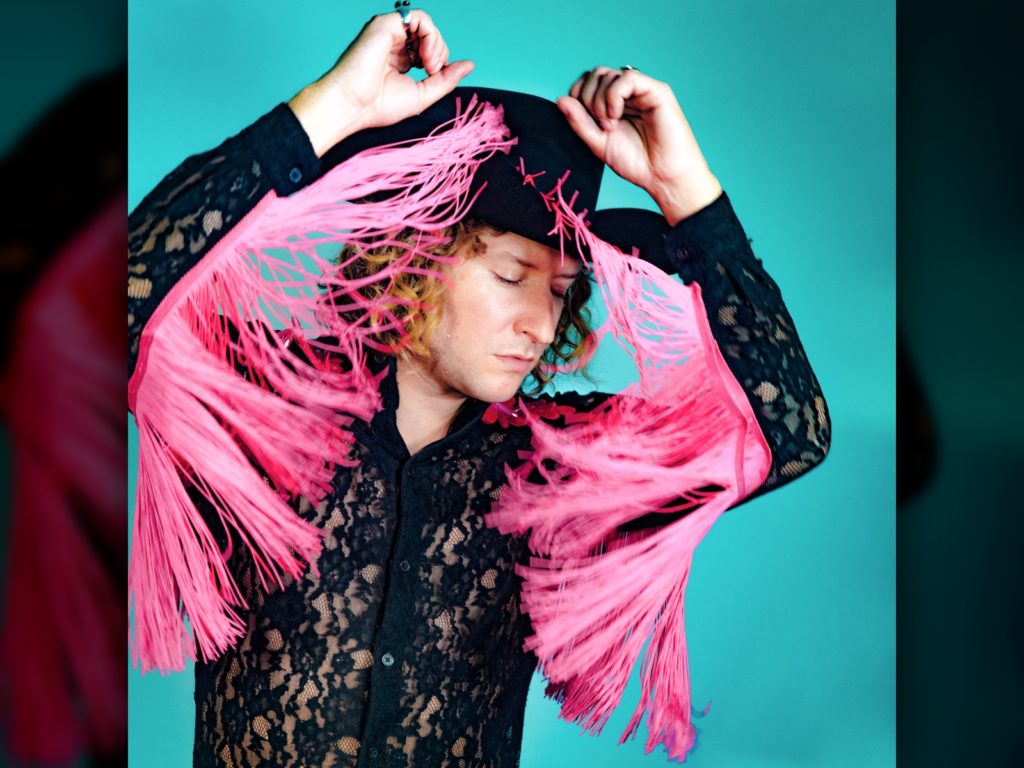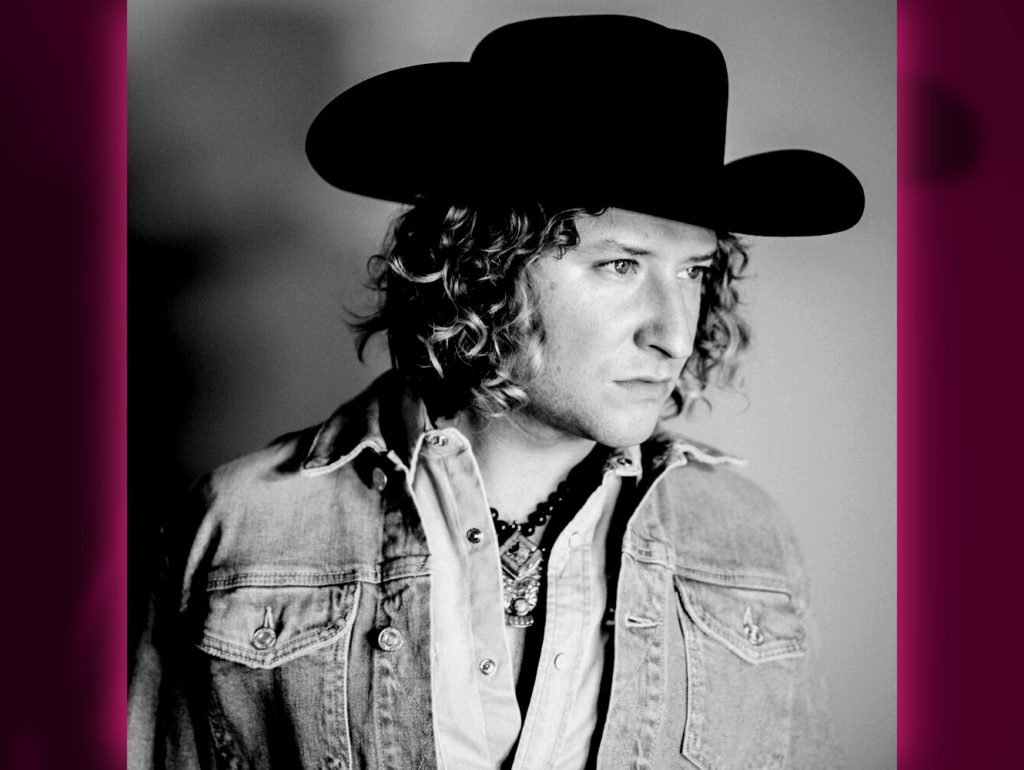The Winding Path to Paisley Fields
From Iowa to Japan to New York, Queer Crooner Blazes Fresh Trails on New Album
By Rachel Cholst, Contributing Editor

It should’ve been a triumphant album release for Paisley Fields. Hot on the heels of his stirring first album, Glitter and Sawdust, Paisley’s new album Electric Park Ballroom covers the full emotional spectrum: bawdy jokes, murder ballads, and sweet sentimentalism. But above all, Electric Park Ballroom revels in the power of queer joy.
Paisley had already started the trek down to Austin, where he was to appear in his first South by Southwest as an official performer, only to see the star-making festival canceled in the earliest days of the pandemic. He had to make his way back to Texarkana, then pack up his belongings in Nashville, where he’d been plugging into a vibrant songwriting community, and hustle back to Brooklyn to join his husband in quarantine.
We spoke about his commitment to becoming a full-time musician, how he continues to evolve, both inside and out, and how he’s thriving within the country music world of Nashville.
Evolution Of a Stage Performer
Paisley Fields has performed under the name for almost a decade. With the release of Glitter and Sawdust, he began to use the band’s name as his own. We asked Paisley about that transition. “I feel like I’ve grown a lot in the last 10 years performing as Paisley Fields. I feel like I identify more as non-binary and I feel like Paisley is a better name for me. It just feels like it fits more naturally.” (Paisley uses he/his/she/her pronouns.)
There are also more practical considerations: “Being a band is usually a unit of three or four of the same people but I’m always performing with different musicians and collaborating with a lot of different artists. So it it feels weird to say we’re a band when there’s usually somebody different onstage with me. So it made more sense for me to just adopt that name.”
Along with changing the band’s personnel, Paisley has also upped the ante on the visual aspects of his show. “I’ve always wanted to explore the feminine side of me. So I’m just having a lot of fun with my appearance. I’ve always loved fashion and I’ve loved dressing up and really pushing the boundaries and seeing what fits and what feels good. I mean, I think that’s a thing that’s always happened in country music,” he observes. “You look at the history and you see Porter Wagoner and Dolly Parton in these big, over-the-top rhinestone suits.”
Of course, queer folks have their own legacy of dressing to the nines. Paisley, who used to work at gay piano bars around New York, also has connections with the drag world. “I love to make people take a second look and be like, what — what is he wearing? I also take a lot of my inspiration from drag culture. I’ve worked with drag queens a lot and just seeing the bold choices that they make in fashion is influential to me.”
Growing Up At the Electric Park Ballroom
“Electric Park Ballroom is a real place. I named the album after it because it’s where I first felt my real connection to country music. It’s a ballroom in Waterloo, Iowa where my family and I would go when I was kid. We’d take line dancing lessons every week and they always played the top country songs,” Paisley reminisces.
These memories were bittersweet, though. “A lot of times I felt that I was not part of the country scene. People like me were not welcome and I didn’t see myself represented. But when I was line dancing, I just felt like, ‘Oh, girl! Line dancing is gay as hell!’ I felt like I fit in there, you know?”
Paisley translates that sentiment into a chugging disco-inspired track, “Shuffling Fool,” replete with high drama and a gracefully daunting fiddle solo. “I thought it’d be cool to make that a dance song since dancing was my first connection to country music.”
From Iowa to Japan and Back
Paisley has been a traveler for as long as he’s been a musician. Growing up in Iowa, he taught himself piano on his sister’s unused Casio. After finishing school, Paisley lit out for New York to be around people more like him. Five years in, he met his boyfriend (now husband). When his boyfriend got laid off from his office job, they decided to move to Japan, where he taught English on the rural island of Shikoku.
In Shikoku, Paisley carved a niche for himself, studying taiko with the village elders, and connecting with with Kazumari Abe, who plays a Japanese bamboo flute known as a shinobue.
“People really liked us. We ended up touring the country, recorded an album, and our concert was broadcast on TV. People were stopping me for autographs. I felt like a celebrity!”
At the beginning of the pandemic, Paisley and Abe reunited for a duet on YouTube.
When Paisley and his husband returned to the states, Paisley decided to go all in on music: performing at a piano bar, teaching piano and voice, working for a record label. But soon he felt those side hustles distracted from his own art.
“I just felt like I had to take a leap. I thought, ‘Okay, if I continue playing in piano bars five nights a week and elevating these other musicians, I’m never going to get anywhere myself. So I just have to go for it and I have to try it now.’ It was a long process and I talked about it with my husband for probably a year before actually doing it. I thought, ‘I’m never going to have another chance to do this. I’ve got to go for it.’”
Paisley now feels it’s time to work on conquering Nashville.
“I wrote with some other artists who had songs that got on the Billboard chart and I thought, ‘Hey, why don’t I try out Nashville? That’s the center of country music.’”
Being Out in Music City
Despite being proudly out, Paisley hasn’t encountered many obstacles throughout his touring career. (Well, there was the one time the lesbian bar in Texas felt he wasn’t the right fit. And another when a venue cancelled hours before the show once they found out that Paisley was as queer as his website described. That one had a happy ending: the promoter was able to find a better location with a friendly audience.)
For the most part, Paisley sees doors opening — though there are still obstacles when it comes to gender presentation. “As I was telling a friend, in country music, you can be queer, but you gotta be butch. That’s not something I’m really wanting to compromise on, so it’s a challenge. But I think fans overall are ready for diversity in country music.”
Paisley encourages fans to stay outspoken and open-minded. “I think the fans can put pressure on the higher-ups there where they feel like, ‘Okay, we need to have a gay person.’” But, he added, “there’s still a lot of challenges and a lot of resistance.”

The Queer Country Mafia
As has so often been the case with queer folks, those grassroots connections are ultimately what strengthen Paisley and his peers. Electric Park Ballroom bears the fruit of that network. “Sam Gleaves and I met on the Queer Country tour with Karen & the Sorrows. Since then we’ve played a few shows together and when I’m in his neck of the woods or he’s in my neck of the woods, we’ll get together and write. Patrick Haggerty from Lavender Country sings on the album. I also collaborated with Mya Byrne, who’s a queer country star herself [Ed. Mya also contributes to Country Queer] and Alex Battles co-wrote a song with me. I love collaborating.”
Those collaborations bring a sense of focus to Electric Park Ballroom. For his previous album, Paisley wanted a concept that expressed the joys and fears of growing up queer in Iowa. This time around, he and his collaborators decided to approach each song individually. Some came off the cuff, like “Ride Me Cowboy,” a raunchy romp written in 15 minutes on a hotel bed while Paisley was on tour.
Then there are songs like the cheeky “The Other Boys,” beautifully illustrated by the music video Paisley and his husband co-created while in quarantine.
“That was fun because I’d never collaborated creatively with my husband before on a project like this. It was really cool and he’s a hobby photographer. He has an eye for these sorts of things already. We were able to work together really nicely. And,” he tells me with a chuckle, “when we started, I promised I wouldn’t be mean to him more than twice.”
As it turned out, that promise wasn’t necessary. Like most of Paisley Fields’ collaborations, the two fed off each other’s creativity to create a polished final product.
Electric Park Ballroom is a journey through the queer experience: heartbreak, alienation, friendship, casual adventures, and true love. “I approached it the same way that I approach a set list when I’m putting on a show and I want to take the listener on a journey. Every story has its peaks and valleys and it was important for me to do that. I didn’t want to have an album of downers or an album full of dance songs. I wanted to reflect our current world, which is completely different now from when I was writing it.”
He pauses.
“Now it’s a snapshot of the past.”